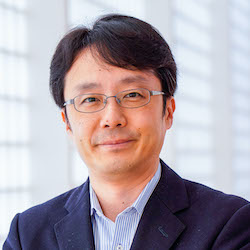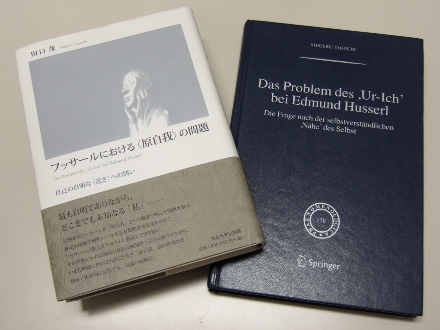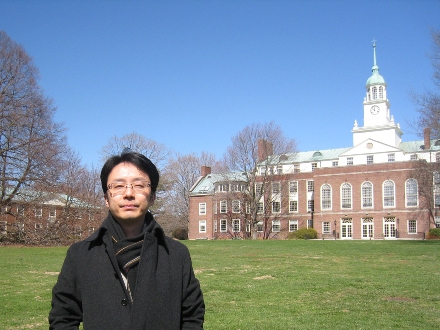Profile

- Research Subject
E. Husserl’s phenomenology, the philosophies of K. Nishida and H. Tanabe, and the enactive approach in cognitive science. My main research topics are ego, subjectivity, intersubjectivity, and consciousness, with a focus on the phenomenology of “mediation.” I am also engaged in interdisciplinary studies of consciousness and reality.
- Research Fields
- Philosophy (phenomenology) and interdisciplinary study of experience
- Faculty - Division / Research Group / Laboratory
- Division of Humanities / Research Group of Philosophy and Religious Studies / Laboratory of Philosophy and Ethics
- Graduate School - Division / Department / Laboratory
- Division of Humanities / Department of Philosophy and Religious Studies / Laboratory of Philosophy and Ethics
- School - Course / Laboratory
- Division of Humanities and Human Sciences / Course of Philosophy and Cultural Studies / Laboratory of Philosophy and Ethics
- Contact
Office/Lab: 605
Email: tag(at)let.hokudai.ac.jp
Replace “(at)” with “@” when sending email.Foreign exchange students who want to be research students (including Japanese residents) should apply for the designated period in accordance with the “Research Student Application Guidelines”. Even if you send an email directly to the staff, there is no reply.- Related Links
Lab.letters


Questioning “Experience” Phenomenologically.
Toward a Dialogue between Philosophy and Science
For many years I have investigated a form of philosophical thinking called “phenomenology.” It is a discipline that analyzes the structures of experience that are usually unnoticed because they are extremely “obvious,” and seeks to articulate them in words. In recent years, several fortunate encounters have led me to collaborate with mathematicians, neuroscientists, and AI/robot researchers. Such collaborations have gradually become a central part of my research. Having worked for a long time in areas that were not specifically related to science, I was initially skeptical about whether my work would be meaningful to scientists, but I have come to realize that what they are looking for is the types of knowledge that they do not have themselves, and that it is precisely the differences between us that give meaning to our collaboration. Due to the diversity of our knowledge and abilities, our collaboration has the potential to take our work to new heights that we could never reach alone. When conducting collaborative research, there are times when you feel as if you have an additional brain (or two or three brains…) outside of your own. Those moments can be very thrilling.

Philosophy transforms experience and life, creating a new world.
Philosophy aims to uncover the preoccupied, seemingly obvious ideas that lurk in our daily lives. As with any field, epoch-making developments are sparked by new insights gained by shifting everyone’s frames of reference and rethinking existing assumptions. This implies that everyone is involved in philosophy in some way. Philosophical ideas definitely have the power to bring about changes in reality. Through philosophy, we are drawn out of our original perspective and into a world we never imagined we would see. I firmly believe that this will be valuable not only in your research but in various aspects of your everyday life.
Message
Just living our day-to-day lives in modern times requires a wide range of complex knowledge and judgement. However, at the root of this complexity that causes us to bury our heads in our hands, there seems to be something relatively simple, a certain way of thinking that determines us. Philosophy helps us to re-discover simple things that are almost invisible in modern times and to re-examine the way we look at things that we unconsciously take for granted. While philosophical discourse may seem strange at first glance, this strangeness itself can sway our thoughts that ordinarily settle for obviousness, serving as a device to reveal our unnoticed preconceptions.
In my team, we assist each other in training ourselves how to read philosophical texts carefully and sharpen our own questions while closely relating them to the reality in which we live. When doing so, I place particular emphasis on the “phenomenological” perspective. I cordially welcome students who are interested in phenomenology, German philosophy, Japanese philosophy, and interdisciplinary research between philosophy, neuroscience, cognitive science, and artificial intelligence. Reading philosophical texts and experiencing different fields and cultures can serve as clues to breaking through the framework of thought that unconsciously fetters you.
It is only through interaction with people who are different from you (at various levels) that you will come to realize the meaning of what you are doing. With additional opportunities to think about ways in which to effectively convey your ideas to researchers from different disciplines or to address various issues together with them, our philosophical thinking will be forced to change. I understand this change to be the process of one’s philosophy becoming more universal so that it can be conveyed to a wider audience.



